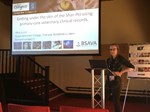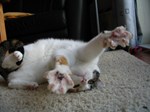Search - Research
91 - 100 of 191 results
-
RVC recognised for Leadership in Openness in Animal Research
Leaders in Openness in Animal Research are organisations who commit considerable resource and energy to following best practice, embedding openness within their organisations and making the aims of the Concordat on Openness on Animal Research a reality.The Royal Veterinary College is one of the first organisations to gain a Leadership in Openness …
-
300 million-year-old animal reanimated as a robot
International group of scientists construct a robot, which is able to recreate how a 300 million-year old animal would have walked -
New One Health textbook empowers learners to take integrated approach to address health challenges
A new textbook called Principles of One Health for a better planet, edited by leading researcher Professor Barbara Häsler from the Royal Veterinary College (RVC) in collaboration with international colleagues, has been published. The book offers an …A new textbook called Principles of One Health for a better planet, edited by leading researcher …
-
Dinosaur Dissection
Professor John Hutchinson, of the Structure and Motion Laboratory, is featured as a principal scientific consultant on a new documentary for the National Geographic Channel "T. rex Autopsy". The show is the first of its kind and features the 12 … -
Latest VetCompass research uncovers new evidence on Rottweilers in the UK
A new VetCompass™ study has revealed novel insights into the demographics, behaviours and disorders of Rottweilers. This information will raise awareness of predispositions in Rottweilers to a variety of behavioural and health conditions and assist … -
VetCompass™ Researchers update BSAVA Congress
The RVC’s VetCompass™ Programme shares anonymised clinical data with over 20% of UK vet practices and is now the largest research database of veterinary clinical data in the world. The impact of the research flowing from VetCompass™ studies was …The RVC’s VetCompass™ Programme shares anonymised clinical data with over 20% of UK vet practices …
-
VetCompassTM study identifies prevalence and risk factors for systemic glucocorticoid usage in dogs in the UK
Glucocorticoids are widely used in primary care veterinary practices. This new VetCompassTM study used data from primary-care clinics in the UK and has revealed that the prevalence of systemic glucocorticoid usage is 6.2%. Staffordshire Bull … -
VetCompass™ at BSAVA Congress 2018
VetCompass™ is now the largest research database of veterinary clinical data in the world and shares anonymised clinical data with over 20% of UK vet practices. The impact of the research flowing from VetCompass™ studies was evident at this year’s … -
VetCompass study reveals new insights on seizures and epilepsy in cats
Neurological disorders are supposedly a leading cause of death in cats but, until now, there has been little information on how commonly cats are affected by seizure disorders or epilepsy. The latest VetCompass study shines new light on these … -
Royal Veterinary College enables students to learn from virtual veterinary experiences in a new phone app
The free app, developed by the VetCompass team at the Royal Veterinary College supports mixed-reality veterinary experience and learning










